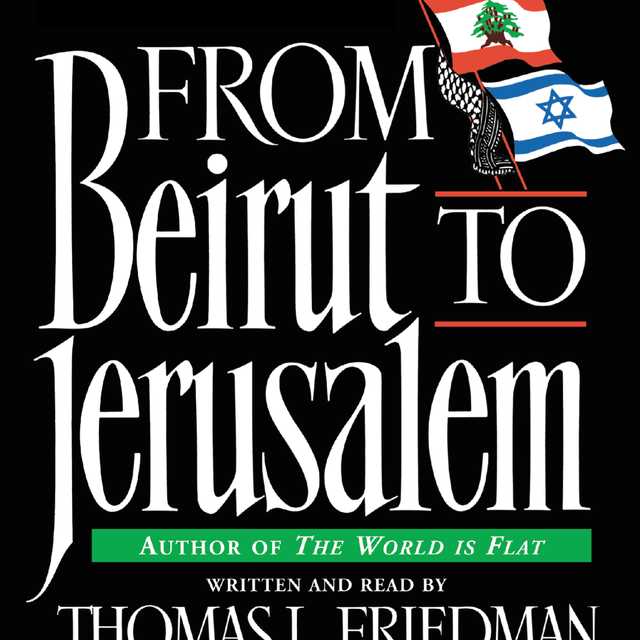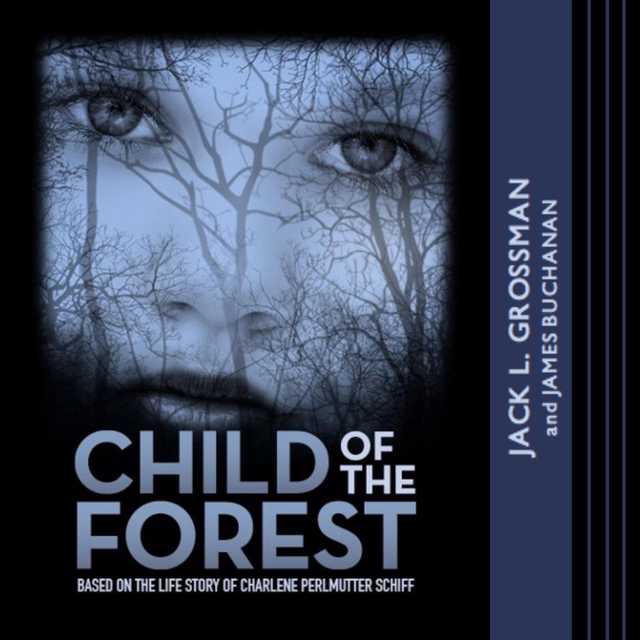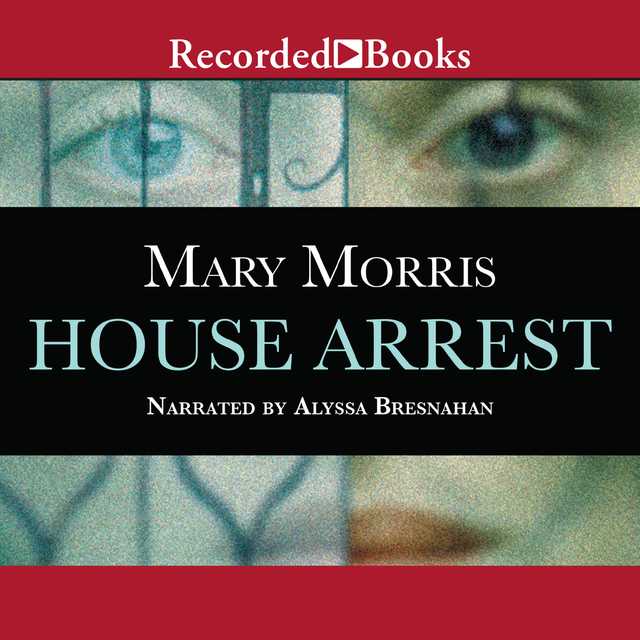From Beirut to Jerusalem Audiobook Summary
In From Beirut to Jerusalem, Thomas L. Friedman of The New York Times, author of The Lexus and the Olive Tree, has drawn on his decade in the Middle East to produce the most trenchant, vivid, and thought-provoking book yet on the region.
No issue in international politics has been more hotly debated than the Arab-Israeli conflict. And no reporter has illuminated both the conflict and the rhythms of life in the Middle East with more immediacy and brilliance than Tom Friedman, twice winner of the Pulitzer Prize for international reporting. Extremism, terrorism, fundamentalism on right and left, Friedman puts all the operative currents into perspective with an inimitable specificity and clarity.
On Friedman’s own remarkable journey from Beirut to Jerusalem, he writes, “This is a book about the people in Beirut and Jerusalem themselves, who were going through remarkably similar identity crises. Each was caught in a struggle between the new ideas, the new relationships, the new nations they were trying to build for the future, and the ancient memories, ancient passions, and ancient feuds that kept dragging them back into the past.” From Beirut to Jerusalem is a major work of reportage, a much needed framework for understanding the Middle East, yesterday, today, and tomorrow.
Other Top Audiobooks
From Beirut to Jerusalem Audiobook Narrator
Thomas L. Friedman is the narrator of From Beirut to Jerusalem audiobook that was written by Thomas L. Friedman
Thomas L. Friedman was UPI’s Beirut correspondent from 1979 to 1981. In 1982, he became the New York Times Beirut bureau chief, winning a 1983 Pulitzer Prize for his coverage of the Israeli invasion of Lebanon. In 1984, he moved to Jerusalem as the Times bureau chief, and in 1988 won a second Pulitzer Prize for reporting. He is also the author of the national bestseller The Lexus and the Olive Tree. He was awarded a Guggenheim Fellowship for his work on this book. He lives in Washington with his family.
About the Author(s) of From Beirut to Jerusalem
Thomas L. Friedman is the author of From Beirut to Jerusalem
More From the Same
- Publisher : HarperAudio
- Abraham
- American Gods [TV Tie-In]
- Dead Ringer
- House of Sand and Fog
- Prey
From Beirut to Jerusalem Full Details
| Narrator | Thomas L. Friedman |
| Length | 3 hours 2 minutes |
| Author | Thomas L. Friedman |
| Category | |
| Publisher | HarperAudio |
| Release date | November 14, 2006 |
| ISBN | 9780061259159 |
Subjects
The publisher of the From Beirut to Jerusalem is HarperAudio. includes the following subjects: The BISAC Subject Code is General, International Relations, Political Science
Additional info
The publisher of the From Beirut to Jerusalem is HarperAudio. The imprint is HarperAudio. It is supplied by HarperAudio. The ISBN-13 is 9780061259159.
Global Availability
This book is only available in the United States.
Goodreads Reviews
Brendan
December 28, 2007
If you're sick and tired of what a pedantic wind-bag Thomas Friedman has become since his stupid 'lexus & olive-tree' epiphany, take a trip back to when he was less pedantic, less wind-baggish, and could make a point without the use of a dozen unnecessary, self-aggrandizing anecdotes.From Beirut to Jerusalem is entertaining, well-written, poignant, and a great primer to middle-eastern/Israeli-Palestinian affairs. The Beirut section of the book is a bit better than the Jerusalem section (I get the feeling he had different editors for each), but overall it remains indispensable reading.
K
November 05, 2009
According to one cynical goodreads reviewer, From Beirut to Jerusalem offers some insight into “two sets of idiots killing each other over a piece of dirt.” My instinctive reaction when I read this was to feel sorry for this reviewer who clearly doesn’t know what it means to have a homeland, and to be so deeply invested in it as to be willing to die for it. My husband pointed out that the reviewer may actually know what it’s like to have a homeland. What the reviewer doesn’t know is what it’s like to have it taken away – a defining experience to which both Israelis and Palestinians lay claim. This is but one of many divides between American culture and what’s going on in the Middle East, which is why Americans may never truly understand what’s happening there. I feel that this book is an excellent attempt at bridging that gap. Friedman writes clearly, and you come away from the book feeling like your understanding of Middle Eastern history and politics has both deepened and broadened greatly. For that alone, it’s a great book. I admit that my feelings toward Israel as a Zionistic Jew currently living here in Israel tend to be emotional and irrational, and I’m aware that it was with no small measure of hypersensitivity and defensiveness that I read Friedman’s criticisms of Israeli behavior. I do applaud Friedman’s efforts to put his Jewish origins aside and report objectively on what goes on in the region. Objectivity and accuracy are important in journalism, even if this means that I won’t always like what the writer has to say.I wonder, though, whether Friedman goes too far in the other direction. I believe that he has succeeded in overcoming feelings for Israel that would lead him to see Israel’s actions through rose-colored glasses and to report the news in a way that attempts to justify them. Instead, his reaction is frequently one of anger when Israel disappoints him and makes him ashamed of his Jewish identity – an equally personal and emotional reaction, and no less biased.Friedman writes the following about his exclusive interview with Major General Amir Drori, the Israeli commander in Lebanon, following the Phalangist massacres at Sabra and Shatila which took place under the Israeli army’s watch:“I must admit I was not professionally detached in this interview. I banged the table with my fist and shouted at Drori, ‘How could you do this? How could you not see? How could you not know?’ But what I was really saying, in a very selfish way, was ‘How could you do this to me, you bastards? I always thought you were different. I always thought we were different. I’m the only Jew in West Beirut. What do I tell people now? What do I tell myself?“…So the next morning I buried Amir Drori on the front page of the New York Times, and along with him every illusion I ever held about the Jewish state.” (p. 166)I’m not trying to justify what happened in Sabra and Shatila. Drori arguably deserved to be buried. But there was clearly a personal agenda here for Friedman, just as personal as a pro-Zionist agenda would have been. Friedman writes with plain disgust about the indignities suffered by the Palestinians under Israeli occupation, an occupation which, incidentally, began after Israel won the territories in a war fought for self-defense. The chapter where Friedman describes this is replete with anecdotes and quotes from victimized Palestinians and bullying Israelis. In contrast, Friedman compares the Palestinian challenge to Israel to a “poke in the ribs.” He goes on in the very next sentence to say:“Palestinians planted bombs in Israeli supermarkets, on their airplanes, under the seats of their buses, and even in an old refrigerator in the heart of Jerusalem. They hijacked their airplanes, murdered their Olympic team, and shot up their embassies.” (p. 347)Some poke in the ribs! Ever ridden on a bus where a suspicious “package” is discovered? I have. So have my children. But that experience doesn’t compare to riding a bus where the suspicious package remains undiscovered. It goes way beyond a poke in the ribs, I can tell you. Interviews with people who have lost arms, legs, or children to this poke in the ribs were woefully missing from Friedman’s account, as was a fair effort to place oppressive Israeli behavior in context. For example, in one particularly painful anecdote Friedman describes a Palestinian man interrupted during an intimate moment with his wife by Israeli soldiers who have come to arrest him. The soldier telling the story admits to wolfishly eying the wife as the husband dresses to accompany them. What Friedman doesn’t tell us is what the Palestinian man had done to deserve his arrest. Would the anecdote read the same way if we were also informed that this man was directly involved in innocent civilian murders? I don’t know what the man’s charges were or whether they were justified, but the complete omission of the context surrounding his arrest makes the story seem very one-sided.Israeli arrests of Palestinians were generally painted by Friedman with a broad brush as largely unwarranted, paranoid behavior by Israelis. I’m not saying this is never the case. But I do think it’s more complicated than Friedman makes it sound. In contrast, behavior by various Lebanese groups in Beirut which might seem unfathomable to a Westerner was carefully explained by Friedman and rendered almost understandable, if not sympathetic.I don’t want to overstate my case. Friedman does discuss Western hyper-scrutiny and quick judgment of Israel, and factors which go into over-reporting by the media of Israeli mistakes. He defends Israeli behavior occasionally, or at least explains it. And I’m sure that if I could get hold of Edward Said’s review of this book, I would get some perspective on Friedman’s possible unfairness in the other direction as well. Finally, as I said, I know that my objectivity when it comes to this issue is sharply limited.Overall, I’m glad I read the book. “From Beirut to Jerusalem” both expanded and deepened my knowledge of what’s going on around me, and I think it’s important for me to start gathering the facts and not just the experiences. My understanding of my position as a Jew here in Israel is far more complex now than it was before I read the book. And the book is readable as well as informative – I whipped through its 500+ pages pretty quickly. My husband, who is better-informed than I am on these issues, summed it up well when he told me that he feels Friedman’s perspective is a legitimate one – but it’s one of many legitimate perspectives out there. And now, I want to read some others. My increasing desire to read further on the subject may be the greatest testimony to the book’s worth.
Vivek
December 03, 2019
Quite insightful. Best part that Friedman offers practically implementable options for initiating a process that in the long run ensures never-ending peace in the Middle East. I wish such a solution makes way into Indo-Pakistan dispute as well.
A Man Called Ove
December 07, 2021
4.5/5 The first half of the book deals with the Civil War in Lebanon. Was greatly reminded of the situation in Afghanistan that I learnt by reading Ahmed Rashid's acclaimed Taliban: Militant Islam, Oil and Fundamentalism in Central Asia. Half-a-dozen tribes/sects and each of them in war with every1 else and the neighbours getting involved to burn their hands. Also realised that Friedman's skill of insightful narration with anecdotes is unparalleled. Finally, understood what it was about.The second half is on the Israel-Palestine conflict. Again the author discusses Zionism, the various sections of the Israeli society, the roots of the conflict,the intifada, its media coverage in the West and the relations between America and Israel in some depth. Was dry for a while in between but mostly interesting. Also liked that views and experiences of a number of people have been recorded as in a travelogue.Cant say it enough, havent seen an author as perceptive with such a great eye on the big picture as Thomas Friedman. Deservedly, he has 3 Pulitzers. And 3 5-star ratings out of the 4 books that I have read by him.
brian
September 13, 2007
it's easy to laugh at friedman: 'he's an intellectual lightweight', 'he's a diehard optimist', blahblahblah... put simply: this is always my first recommendation for anyone curious to read about the middle east. that's because it's fucking great. should be required reading.
Dave
July 28, 2007
A very insightful book that tells the story of two different cultures at odds, not just with one another, but with themselves. He draws parallels between these two disparate societies by focusing on each one's search for identity. In addition to the politics, greed, and the arrogant assumption that cruelty can be justified by an invisible sociopath in the sky described in this book, the author also beautifully conveys the dignity and sanity of which human beings are capable, even in the worst situations.I don't pretend to know a hell of a lot about politics and I've never been off of the North American continent, so I can't say much about the accuracy of the author's assessments or predictions, but they seem a lot more realistic than the cartoonish view of the world that Sean Hannity and his merry band of jackasses at Fox News present.So, if you want to read a very clever book about a bunch of idiots killing each other over a patch of dirt, then this is for you.
Chafic
May 13, 2019
This book is older than I am.But, I had read it while I was in Lebanon - and while dated, time hasn't changed the underlying commentary in the book.What would normally spark quite a heated debate is broken down and approached from a historical/empirical view of the matter that highlights the different dynamics of both Lebanon and Israel.It's well-written, it's informative and got my 24-year old adolescent brain actually thinking about a topic I've been oblivious to.
Will
March 22, 2022
I think too often it is easy for us all to engage in political discussions under the guise that we either a) pretend to know what we are talking about or b) acknowledge that we don’t know but continue to campaign for our point with such little knowledge. I found this particularly prudent with discussions surrounding the Middle East and having acknowledged that I myself was a perpetrator of such behaviours, I set out reading this book with the goal of being educated enough to hold a discussion on this issue.While I can’t yet say that I am even close to expert on this topic, or that I know what I am talking about half the time, I am confident that I have enough knowledge to hold a conversation. Moreover, i am certain that this book has demonstrated to me the complexity of the Middle East situation and that I will no longer make blanket statements without proper consideration of the repercussions.This book was incredibly written. I especially found the first half- which focussed on Beirut- enjoyable, partly because I could relate to it but also because it was more action packed. The second half was still important and interesting but I struggled to connect with it all, in particular with chapters on the American Jewry. Despite this shortcoming, it was key to me gaining an understanding of the Israeli state and the current Israeli-Palestinian conflict. While I did sometimes find the book slightly biased through an American Jewish lens, I acknowledge that this was largely a response of my own previous experiences, as much as a lack of understanding of the Jewish outlook on the Israeli state.Though this book may not be new, and lacks content from the last 25 years, in many way this serves as a historical strength. It is key towards gaining a deeper understanding of the root of middle eastern conflicts which seems to be layer upon layer of increasingly complex and tense dilemmas, born in a history of religious idealism and political righteousness. Finally Thomas Friedman is an excellent writer, journalist and someone who I would very much like to meet. He has inspired me to consider international journalism as a career and I have the utmost admiration for the situations he has found himself in and the ways he has coped.When I set out in October last year it was my goal to finish it by the end of the year. And while I may have fallen short of that, I am very happy that I persisted because I believe I am now a more considered and aware person (at least on this issue).I strongly recommend this book to anyone who would like to learn more- hope that we can have some educated debates soon!
Noah
July 01, 2009
I am woefully ignorant of most of the conflicts in the Middle East, and even though the information in this book is pretty dated, it offers a useful window into the dynamics in Lebanon and Israel. Friedman writes with restraint and insight, and has some truly great pieces of analysis, like the chapter on Israel and Jewish identity. Now if he could only stop indulging his analogy fetish. Which one is it, Tom? Is the Middle East like an ice cream cone, or is it like The Great Gatsby? Make up your mind!
Dalius
May 26, 2021
Pasaulis yra milžiniškas katilas, kuriame nuolatos verda gyvenimas. Jis pripildytas istorijos, geopolitikos, religijos, politikos. Todėl suprasti arba bent kažkiek geriau suvokti tam tikrus įvykius yra be galo sunku. Kiekvienas sako "savąją tiesą", nuslėpdamas dalykus, netinkančiui jo kuriamai istorijai, pridėdamas savo detalių ir pan. Gyvendami savo mažajame pasaulyje, globalųjį pasaulį matome, tarsi, džiugles, tankias ir painias. Kartais mums sunku susigaudyti, kas vyksta savajame kieme, o ką jau kalbėti apie kitas kultūras, religijas, istorijas..Ši knyga, tai mažas šviesos spindulys, leisiantis bent kažkiek geriau suprasti artimų rytų gyvenimo virtuvę.
Susan O
August 18, 2016
I really enjoyed this book, but more so when I realized it was memoir rather than history. Friedman is writing about his time as a journalist in Beirut and Jerusalem roughly between 1979 and 1989. He was in Beirut during the Lebanese civil war and the Israeli invasion, intended to drive out Arafat and the PLO, and moved on to Jerusalem in time for the first intifada, beginning in 1987. I enjoyed the first half of the book more and feel that he did a better job in it of simply reporting the circumstances with sufficient historical background for it all to make sense. He lived in Beirut while there and although he conducted interviews with leaders and individuals from all the different factions, this portion of the book seemed to include more personal observations and, as another reviewer noted, fewer analogies. But when he got to the portion of the book when he was living in Jerusalem there seems to be more emphasis on the philosophies of various groups. I appreciated learning about the different perspectives of various groups of Zionists, there was a wider range than I realized, but by the end the interviews seemed excessive. Perhaps, this is because Friedman is Jewish and wanted to avoid interjecting his personal opinion, so he gave many others a voice. I wouldn't say as some others do that he was overwhelmingly biased in favor of Israel. He takes everyone to task at some point - the Israelis, the Arab countries, the PLO, and the Americans. However, it did seem that the Israeli position received more of a platform than that of the Palestinians. This could be because of whom he had access to. Overall, even though the book is dated, I'm glad I read it. It had been on my shelf for years, but if you are interested I would suggest trying to pick up a used copy since it doesn't have any up to date information.
Most Popular Audiobooks
Frequently asked questions
Listening to audiobooks not only easy, it is also very convenient. You can listen to audiobooks on almost every device. From your laptop to your smart phone or even a smart speaker like Apple HomePod or even Alexa. Here’s how you can get started listening to audiobooks.
- 1. Download your favorite audiobook app such as Speechify.
- 2. Sign up for an account.
- 3. Browse the library for the best audiobooks and select the first one for free
- 4. Download the audiobook file to your device
- 5. Open the Speechify audiobook app and select the audiobook you want to listen to.
- 6. Adjust the playback speed and other settings to your preference.
- 7. Press play and enjoy!
While you can listen to the bestsellers on almost any device, and preferences may vary, generally smart phones are offer the most convenience factor. You could be working out, grocery shopping, or even watching your dog in the dog park on a Saturday morning.
However, most audiobook apps work across multiple devices so you can pick up that riveting new Stephen King book you started at the dog park, back on your laptop when you get back home.
Speechify is one of the best apps for audiobooks. The pricing structure is the most competitive in the market and the app is easy to use. It features the best sellers and award winning authors. Listen to your favorite books or discover new ones and listen to real voice actors read to you. Getting started is easy, the first book is free.
Research showcasing the brain health benefits of reading on a regular basis is wide-ranging and undeniable. However, research comparing the benefits of reading vs listening is much more sparse. According to professor of psychology and author Dr. Kristen Willeumier, though, there is good reason to believe that the reading experience provided by audiobooks offers many of the same brain benefits as reading a physical book.
Audiobooks are recordings of books that are read aloud by a professional voice actor. The recordings are typically available for purchase and download in digital formats such as MP3, WMA, or AAC. They can also be streamed from online services like Speechify, Audible, AppleBooks, or Spotify.
You simply download the app onto your smart phone, create your account, and in Speechify, you can choose your first book, from our vast library of best-sellers and classics, to read for free.
Audiobooks, like real books can add up over time. Here’s where you can listen to audiobooks for free. Speechify let’s you read your first best seller for free. Apart from that, we have a vast selection of free audiobooks that you can enjoy. Get the same rich experience no matter if the book was free or not.
It depends. Yes, there are free audiobooks and paid audiobooks. Speechify offers a blend of both!
It varies. The easiest way depends on a few things. The app and service you use, which device, and platform. Speechify is the easiest way to listen to audiobooks. Downloading the app is quick. It is not a large app and does not eat up space on your iPhone or Android device.
Listening to audiobooks on your smart phone, with Speechify, is the easiest way to listen to audiobooks.











![The Magic of Recluce (2 of 2) [Dramatized Adaptation]](https://speechify.com/audiobooks/wp-content/uploads/sites/29/2023/06/pr_eaudio_9781648809774_640px.jpg)


















